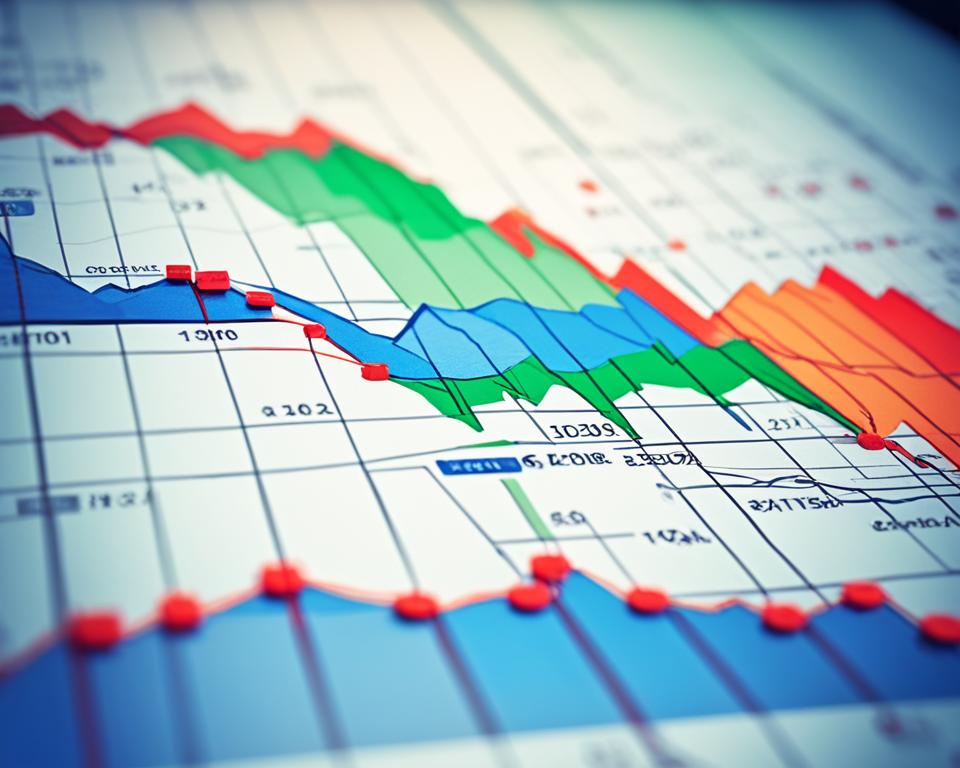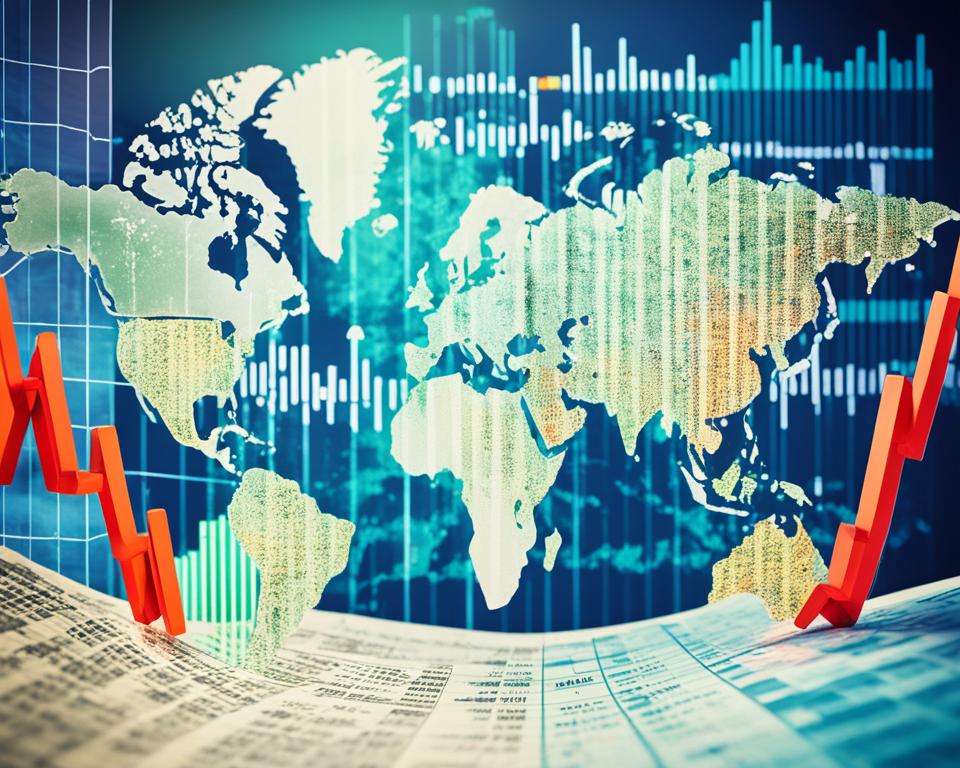You may have noticed that headlines often hint at a complex dance between geopolitics and financial markets. Whether it’s trade wars, election outcomes, or international conflicts, these events can send ripples through equity markets, move the foreign exchange rates, and swing investor sentiment. Through it all, dividend stocks often come into focus, offering a beacon of stability in the choppy waters of global finance.
But how exactly do these geopolitical events shape the destiny of your investments, particularly companies returning profits to shareholders as dividends? Let’s unravel this nexus and understand why, amidst the global upheavals, your portfolio’s familiarity with dividend stocks might be more crucial than you think.
Key Takeaways on Dividend Stocks Amidst Geopolitical Events
- Geopolitical events can cause immediate and significant fluctuations in financial markets, influencing both investor sentiment and the performance of dividend stocks.
- Currency markets may react more rapidly to geopolitical news, while equity markets’ responses are more measured over time.
- During times of geopolitical tension, dividend stocks might serve as a safe haven for investors seeking stable income.
- Investor sentiment towards dividend stocks can become increasingly positive as they seek security in consistent returns.
- Understanding the connection between geopolitical events and market responses is essential for informed investment decisions in dividend stocks.
Understanding Dividend Stocks in a Geopolitical Context
When the world stage is marred by geopolitical upheavals, savvy investors often recalibrate their portfolios towards more stable investments. Amidst such flux, dividend stocks emerge as stars of reliability. So, what are these assets, and how does the complex geopolitical context shape their performance? Here’s an eye-opening glimpse into this dynamic.
What Are Dividend Stocks?
At their core, dividend stocks symbolize the portion of a company’s earnings returned to shareholders as dividends. These payments are typically made by organizations with a track record of consistent profitability, underscoring their ability to generate steady income over time. For investors, especially those eyeing the best dividend stocks or the top dividend paying stocks, these equities represent not just earnings, but a testament to corporate stability and long-term performance.
The Role of Geopolitics in Dividend Stock Performance
In the ever-evolving political and economic global landscape, dividend stock performance doesn’t escape unscathed. Sharp turns in geopolitical scenarios—from sanctions to trade policies—can jolt markets, triggering a reassessment of stock viability. For you, the investor, it’s crucial to discern how such events could reframe the profitability and appeal of dividend-yielding assets.
In light of geopolitical context, dividend stocks often glean the image of financial sanctuaries. Amidst market tumult, these steadfast performers attract investors seeking to buffer their capital from the storm of uncertainty. But it’s not just investor sentiment that’s swayed; real shifts in capital from volatile economies to those perceived as strongholds can palpably affect your returns.
Given this intertwining of dividend stocks and global events, it’s vital to comprehend their symbiosis. To aid in this understanding, consider the following overview that compares the dividend stock performance of renowned companies in different geopolitical climates. It illustrates not just the resilience of these stocks, but their allure when the economic weather turns gloomy.
| Company | Dividend Yield Before Geopolitical Event | Dividend Yield After Geopolitical Event | Change in Investor Sentiment |
|---|---|---|---|
| Company A | 3.5% | 4.0% | Increased |
| Company B | 2.8% | 3.2% | Stable |
| Company C | 4.2% | 3.9% | Decreased |
| Company D | 5.0% | 5.5% | Significantly Increased |
From this snapshot, you’ll see how geopolitics can recast the dividend landscape, prodding investors to consider how best to navigate these waves. By staying attuned to the global drumbeat and its interplay with markets, you’re better positioned to strategize and potentially secure the best dividend stocks as part of your investment compass during these turbulent epochs.
The Immediate Impact of Geopolitical Shocks on the Market
As an investor, you’re not just in the business of predicting economic trends, but also in interpreting how sudden geopolitical shocks reverberate through global markets. These events, ranging from diplomatic strains to full-fledged conflicts, often create ripples—some immediate, some long-lasting—in currency and equity markets alike.
Understanding the nuances of market behavior in the wake of such shocks can give you a much-needed edge. Let’s delve into how these events typically affect different market sectors, and reflect on some historical shifts that exemplify these trends.
Reactions of Currency and Equity Markets to Geopolitical Events
The response of currency markets to geopolitical shifts can be almost instantaneous, frequently resulting in drastic valuation swings. Equity markets, by contrast, show more gradual adjustments, reflecting broader investor sentiment trends as stakeholders digest the longer-term implications of geopolitical shocks on corporate stability and earnings potential.
For instance, in the currency sphere, traders might swiftly reassess risk profiles and adjust their portfolios to hedge against potential negative outcomes—a dynamic that explains the volatility often observed in forex markets immediately following geopolitical developments. Equity markets also react vigorously, though the strategies here are more diverse, with investor sentiment swinging from cautious withdrawal to opportunistic engagement depending on the nature of the geopolitical event.
Historical Case Studies: From 9/11 to the Arab Spring
Take, for example, the 9/11 attacks, which led to a profound immediate impact on the US financial markets, triggering massive sell-offs and heightened market anxiety. In the days following the attack, the New York Stock Exchange remained closed, and when it reopened, it experienced significant declines. Yet, these equity markets eventually regrouped, as investor sentiment slowly shifted from fear to cautious optimism over subsequent months.
Another poignant example is the Arab Spring. The regional uprisings had an abrupt impact, not just politically but economically, as global markets braced for uncertainty—especially in the oil sector. Yet, despite initial losses, the resilience of the markets became apparent as they stabilized and corrected over time, illustrating the transient nature of geopolitical shocks on investor sentiment trends.
While these case studies are historical, they persist as cautionary yet instructive tales for investors and highlight the importance of keeping a keen eye on global events—a practice as relevant today as ever.
Long-Term Effects on Investor Sentiment and Market Behavior
Geopolitical events invariably imprint their mark on the financial markets, with both immediate and enduring ripples. In the throes of such events, you may witness an initial shockwave that sends investor sentiment and market behavior into a state of flux. However, as the dust settles, a pattern emerges: investor sentiment analysis reveals a recuperative trend, leading markets to restore equilibrium over time.
This recovery is not always swift—it may transpire over months or even years. The long-term effects of geopolitical instability tend to etch more deeply into the investor psyche, compelling you to recalibrate your financial compass, occasionally steering towards the traditionally more secure dividend stocks. To elucidate how geopolitical events can exert these extended influences, let us consider the typical trajectory of investor sentiment post such events.
- Initial Reaction: Amidst geopolitical tensions, a spill of uncertainty swamps the market, with investor sentiment reflecting heightened caution.
- Middle Game: As the events unfold, particularly those with global economic implications, you will often observe a bifurcation in investor behavior—the risk-averse pull back, while the opportunists double down.
- Long-term Adjustment: Gradually, a collective understanding of the ‘new normal’ develops, and the market adapts, with dividend stock performance often receiving a closer examination as a barometer of stability.
Yet, it’s not purely a reactionary game. Veteran investors and market analysts alike typically begin to implement strategies to mitigate volatile market conditions. They may gravitate towards companies with strong dividend histories that signify resilience—a practice that tends to cushion investment portfolios against ongoing geopolitical concerns.
| Period Post-Geopolitical Event | Investor Sentiment Trend | Market Volatility | Focus on Dividend Stocks (Increase/Neutral/Decrease) |
|---|---|---|---|
| Immediate (0–3 months) | Negative to cautious | High | Increase |
| Short-term (3–12 months) | Mixed, with emerging optimism | Medium to high | Neutral to increase |
| Long-term (1 year +) | Stabilizing to positive | Medium to low | Neutral |
In your own journey as an investor, recognizing these long-term patterns can empower you to make informed choices. It’s not just about riding out the storm, but also about discerning the opportunities that arise in a recalibrated market landscape. Dividend stocks may not just be an anchor but can serve as a sail to navigate through the choppy waters of geopolitical uncertainty.
Geopolitical Risks as ‘Beta Drivers’ for Dividend Stocks
As you explore the investment landscape, you’ll often encounter the term ‘beta drivers.’ These are variables that significantly affect the returns of a portfolio, beyond the impact of broad market movements. Within this framework, geopolitical risks stand out, particularly for their influence on dividend stocks. Such risks can arise from global tensions, wars, or acts of terrorism, leading to shifts in the equity market that can be critical for your investment strategy.
Why are geopolitical risks considered beta drivers? The answer lies in their unpredictable nature and their ability to cause sweeping changes in investor sentiment. Let’s delve deeper into the interplay between these risks, equity market reactions, and the perception of dividend stocks during such uncertain times.
Equity Market Reactions: Negative versus Positive Events
Geopolitical risks are not uniform in their impact. Negative events, such as sudden conflicts or economic sanctions, can induce panic and lead to heightened equity market reactions. In these instances, you might observe a sell-off in general markets, but interestingly dividend stocks can act as a bulwark against the storm. This is because, during truculent periods, investors have historically gravitated toward the relative security of established companies known for their consistent dividend payouts.
Geopolitical Risk Indexing and Stock Market Correlation
To navigate these complexities, investors often turn to tools like the Geopolitical Risk Index (GPR), which offers a gauge on the level of global instability. Yet, while geopolitical risk indexing can provide valuable insights, the correlation with market performance isn’t always straightforward. Sometimes, despite a surge in perceived risks, markets can show resilience, with dividend stocks displaying lesser vulnerability to these fluctuations due to steady income streams that they are able to provide investor portfolios.
In this intricate dance, your understanding of stock market correlation with geopolitical indexes can serve as an anchor, helping you to discern patterns and make more informed choices—choices that consider not just the current investor sentiment but also the historical market performance under similar circumstances.
Whether you’re looking to shield your investments from volatility or seeking opportunities amid the turbulence, a keen eye for dividend stocks during these cycles could prove pivotal. As an investor, aligning with this perspective can help you stay a step ahead, turning geopolitical risks into strategic moves within your portfolio.
The Dichotomy of Geopolitical Acts and Threats
Within the investment world, understanding how to navigate through periods of geopolitical uncertainty is critical. The landscape is often a complex blend of actual geopolitical acts—such as sanctions or military confrontations—and the looming specter of geopolitical threats. These elements influence your investment decisions in distinct ways, shaping strategies and outcomes particularly in the realm of dividend stock strategies.
Perceptive investors are keenly aware that geopolitical acts often result in direct but transient market reactions. These serve as inflection points, where the underlying uncertainty often resolves itself with the event’s fallout. In contrast, enduring geopolitical threats may not immediately manifest in market swings but tend to infuse long-term investment perspectives with hesitancy and caution.
Investment Decisions in Face of Geopolitical Uncertainty
When you’re faced with geopolitical threats, there’s an inclination to adopt a wait-and-see approach, particularly where capital investments are concerned. This reticence largely stems from a desire to avoid committing resources amidst nascent risks—yet, this is not always the case with dividend policies. Here, resilience is often the keyword as companies aim to stabilize investor sentiment and underscore confidence despite geopolitical threats.
The following table reflects hypothetical but commonly observed reactions of firms in situations of heightened geopolitical tensions:
| Geopolitical Scenario | Impact on Capital Investments | Impact on Dividend Strategies |
|---|---|---|
| Announcement of trade sanctions | Postponement of planned expansions | Maintenance or slight increase in dividends |
| Military conflicts in key markets | Reduction of capital budget | Stable dividends to assert financial health |
| Rising geopolitical threats | Cautious approach; concentration on liquid assets | Reassurance through consistent dividend payout |
The dichotomy between geopolitical acts and threats, and their consequent influence on investment decisions and strategies, reflects the dynamic interplay of risk assessments and market predictions. Keeping this dichotomy in mind empowers you to align your portfolio in a way that anticipates and responds adeptly to both the immediate and extended effects of global events on the financial landscape.
Analyzing Top Dividend Paying Stocks During Geopolitical Tensions
When geopolitical tensions mount, the financial crucible that shapes market trends can lead to unpredictable outcomes. Yet, amidst these uncertainties, top dividend paying stocks often distinguish themselves as investment beacons, their steadfast yields promising a degree of stability. You, as a discerning investor, may have considered whether these stocks truly merit such confidence.
Let’s harness the lens of performance analysis to inspect the resilience of high dividend yield stocks within such volatile times. Tensions arising from geopolitical unrest do more than disrupt diplomatic relations; they ripple through the financial markets, fostering an environment where astute analysis becomes paramount.

Performance of High Dividend Yield Stocks in Volatile Times
In the throes of geopolitical upheaval, where do high dividend yield stocks stand? Historical data has repeatedly shown that these stocks tend to outshine their counterparts, offering solace to investors aiming to shield their portfolios from the tremors of international disputes and policy shifts.
This capacity for resilience, however, isn’t uniform across all sectors. While some sectors may flourish under duress, others falter, underscoring the need for rigorous sector analysis. The following table provides a snapshot of the performance trends of high dividend yield stocks across various industries during past periods marked by geopolitical tension:
| Sector | Average Dividend Yield Before Tension | Average Dividend Yield During Tension | Market Sentiment Shift |
|---|---|---|---|
| Utilities | 3.5% | 4.1% | Positive |
| Consumer Staples | 2.8% | 3.0% | Stable |
| Information Technology | 1.7% | 1.6% | Negative |
| Healthcare | 1.9% | 2.2% | Positive |
As the table illustrates, sectors traditionally viewed as defensive — like utilities and consumer staples — typically see an uptick in average dividend yield. This reinforces the narrative that top dividend paying stocks within these domains can serve as reliable harbors during geopolitical storms.
Firms known for their handsome payouts may not only sustain dividend yields but potentially enhance them as they navigate through these challenging times, further endearing them to investors prioritizing steady income. Such performance analysis allows you to discern the nuanced responses of high dividend yield stocks amidst the global tumult and adapt your investment choices accordingly.
Yet, it’s not just about shelter-seeking. For some, it’s about identifying those dividend-paying stalwarts presiding over sectors less swayed by geopolitical tensions, those that continue to deliver robust earnings. This strategic differentiation is what sets apart the mundane browsing of stock tickers from the sophisticated practice of analyzing dividend stocks.
As you continue to curate your portfolio, remember that the backdrop of geopolitical tensions necessitates a closer examination of market sentiment trends. This active, analytical approach toward high dividend yield stocks is what positions you to not just endure, but to capitalize amid the flux of the financial markets.
How Dividend Stocks Serve as Investor Safe Havens
As the geopolitical landscape wavers with uncertainty, the clarion call for investment choices that offer stable income grows louder. Enter dividend stocks, akin to financial lighthouses guiding investors through a fog of market volatility. Time and again, when geopolitical tensions stir the seas of global finance, these stocks step up as investor safe havens, promising relative calm and continuity in a world of economic tumult.
Dividend stocks are often characterized by their market resilience, making them a smart choice for preserving capital amidst international disputes and strains. When storms of geopolitical strife hit the markets, the invested capital tends to flow towards these bastions of stability. It may seem like a conservative play, but in crafty hands, such stocks are strategic chess pieces making a defensive gambit in the game of investment.
Here’s a deeper look at the performance of various dividend-paying sectors during times of geopolitical unrest:
| Sector | Historical Stability | Dividend Yield Trend | Investor Preference During Unrest |
|---|---|---|---|
| Utilities | High | Increasing | Favored |
| Consumer Staples | Medium to High | Stable | Preferred |
| Healthcare | Medium | Stable to Increasing | Maintained Interest |
| Energy | Low to Medium | Variable | Speculative Based on Events |
Despite the chaos that may reign over the markets, these sectors have proven capable of offering the much-coveted stable income, justifying their role as investor safe havens. What beckons is more than mere shelter; it’s the assurance that amidst the turbulent waves of the geopolitical, lies a steady stream of income, undisturbed.
In choosing these stocks, you are not just seeking refuge but are also planning your next move—a prudential approach that anticipates squalls on the horizon and sets a course for potentially smoother seas ahead.
Geopolitical Events and the Psychology of Investing
When geopolitical events unfold, their shockwaves are felt not just in physical spaces but also in the financial realms where the psychology of investing plays a critical role. These events can sway the collective mindset of the market, influencing decisions that range from cautious to opportunistic.
As an investor, you might have experienced the turbulence that comes with geopolitical instability. Whether it’s tension between nations, unexpected elections results, or sudden trade sanctions, these events can mold your perceptions and as a result, prompt a shift in your investment strategies.
Investor Sentiment Analysis and Trends
The tools of investor sentiment analysis are more relevant than ever in decoding the psychology of investing. Sentiment analysis delves into the mood of the market, uncovering trends that indicate how investor attitudes evolve in response to global developments. During times of geopolitical strife, you might observe a sentiment trend where market reactions shift from panic to calculation, affecting both individual and institutional investors.
The tableau below depicts how investors tend to respond to different geopolitical events, reflecting the sentiment trends that emerge:
| Geopolitical Event | Initial Market Reaction | Subsequent Sentiment Trend |
|---|---|---|
| Election Outcomes | Mixed based on anticipated policies | Trend towards sectors favored by new administration |
| Trade War Escalation | Negative, sharp sell-offs in affected industries | Gradual return to normalcy as markets adapt to changes |
| Military Conflicts | Immediate risk aversion, flight to safety assets | Potential opportunistic buying once initial shock subsides |
By tracking these sentiment trends, your approach to stock selection and risk tolerance might evolve. You may lean toward sheltering your investments in stable assets like dividend stocks during peaks of volatility or, contrarily, attempt to leverage market dislocations to acquire undervalued assets in anticipation of a rebound.
Geopolitical uncertainty indeed underscores the often fluid nature of sentiment trends, emphasizing the need for vigilance and adaptability in your investment choices. Recognizing and understanding these shifts can guide you to make more informed decisions, potentially capitalizing on the ebb and flow of market reactions instigated by geopolitical events.
Assessing the Resilience of Best Dividend Stocks to Geopolitical Risk
As an investor seeking shelter in the capricious world of financial markets, you might consider best dividend stocks as a potential steadying force amid the often tumultuous impact of geopolitical risk. Dividend-paying stocks are known for their potential to offer stability and consistent returns, sometimes even amidst market downturns. It’s in their resilience where you’ll find the fortitude to weather geopolitical storms—an imperative component of investment risk assessment.
What affords these dividend stocks their steadfast image? Is it merely a façade, or do they possess inherent fundamentals that offer real protection? Delving deep into these queries is vital when assessing resilience and determining the survivability of your investments in the face of global strife.
With an eye to enhancing your strategy during uncertain times, let’s explore the sturdiness factors contributing to the hardiness of optimized dividend portfolios.

Factors Contributing to the Sturdiness of Top Dividend Stocks
Imagine your dividend stocks as soldiers positioned on the front lines where volatility is the norm. The volatility spurred by events such as trade embargoes, political coups, or escalating cross-border tensions, can test even the most robust stock’s metal. As such, specific factors become the armor by which you assess investment choices, especially when considering assessing resilience in light of geopolitical risk.
- Company’s financial health: A strong balance sheet and minimal debt can be indicative of a company’s capability to continue paying dividends even when times are hard. Assessing a company’s financial stability is akin to checking the thickness of armor.
- Consistent earnings history: Like a steady heartbeat, a history of stable earnings signals life, showing that a company can endure economic winters and maintain dividend payouts.
- Strategic market positioning: Much like high ground in battle, a company holding a dominant position in its industry may have the strategic advantage to withstand geopolitical upheaval better than its competitors.
- Sector-specific resilience: Certain sectors such as utilities or consumer staples are like fortified castles that typically endure sieges of market volatility with more resilience.
Every investor’s endeavor is to park their resources in assets that can stand the siege of geopolitical risk. Positioning yourself in the bastion of the best dividend stocks requires meticulous analysis of these sturdiness factors. Such due diligence in investment risk assessment may not ensure victory in every skirmish, but it does arm you significantly for the many battles of market upheaval.
The Influence of Global Events on Dividend Stock Strategies
Amid the ebb and flow of global events, knowledge is power, particularly when it comes to crafting robust dividend stock strategies that can weather the storms of geopolitical crises. Grasping the seismic shifts these crises can cause in the market enables investors like you to develop investment strategies designed to not just survive but thrive.
Whether it’s the tension between nations, tariff wars, or other unforeseen incidents, these occurrences demand a nuanced approach to portfolio diversification, incorporating dividend stocks as a key component. Balancing risk and opportunity sets the stage for portfolio optimization, with dividend stocks offering a blend of stability and potential gains.
Investment Strategies During Geopolitical Crises
When geopolitical tension tightens its grip on the global stage, savvy investors often turn to dividend stocks as cornerstones in their portfolios. They perform a delicate balancing act, tactically positioning themselves to embrace opportunities amidst volatility, while seeking the anchor of reliable dividend payouts to temper market uncertainties. Crafting an investment blueprint during such times hinges on a blend of vigilance and strategic maneuvering.
Portfolio Diversification and Dividend Stocks
In an era defined by rapid geopolitical oscillations, diversification no longer just supports but actually drives investment strategies. Spreading assets across industries, regions, and security types, including dividend stocks, forms a defensive moat that can protect your investments from geopolitical upheaval. This strategic mix positions you to navigate global events with resilience—minimizing risks while also capitalizing on potential upswings.
It’s this versatility that underscores the importance of dividend stocks in a well-rounded portfolio. Not only do they introduce an element of passive income, they also add a layer of insulation against geopolitical crises. Here, income meets independence, as these stocks frequently buck market trends, offering solace to investors during even the most tumultuous climates.
Corporate Responses to Geopolitical Concerns
Understanding how corporations navigate the unpredictable tides of geopolitical concerns is crucial for investors. In light of rising geopolitical tensions, we often witness strategic shifts in corporate behavior, particularly regarding capital investments and dividend policies. These responses are reflective of businesses attempting to protect their financial standing while reassuring shareholders amidst turbulence.
Cuts in Capital Investments in Response to Geopolitical Risk
When geopolitical risks climb, corporations tend to take a defensive stance—especially concerning capital investments. It’s not uncommon to see capital investments cuts as a prevalent corporate response to geopolitical concerns. Companies employ this tactic to avoid being caught off-guard by changes in the geopolitical landscape that could render investments less profitable, or worse, unrecoverable.
Here is a simplified illustration showing how different industries might reduce capital investments in response to elevated geopolitical risk:
| Industry | Typical Capital Investment | Reduction Strategy |
|---|---|---|
| Technology | New Product Development | Delay in R&D projects |
| Manufacturing | Equipment Purchase | Postponing upgrades |
| Energy | Exploration Activities | Suspension of new endeavors |
Dividend Policies During Periods of Geopolitical Instability
Unlike capital investments, dividend policies may not face the cutting block even amidst heightened geopolitical concerns. A solid dividend policy provides reassurance and a sense of stability to shareholders. Thus, many firms choose to maintain or even increment dividends during these periods to project financial health and mitigate investor apprehension.
Consider this approach through the lens of the following hypothetical scenarios:
| Event | Corporate Dividend Approach |
|---|---|
| Diplomatic tension leads to economic sanctions | Upkeep of dividend payout ratios to sustain investor loyalty |
| Trade policies impacting global operations | Small dividend increases to demonstrate confidence amid risks |
| Political unrest in a region with business operations | Continuation of dividends to signal long-term corporate strength |
Ultimately, the way corporations handle geopolitical challenges sends a powerful message to the market. Their actions in reducing investments, yet balancing them with thoughtful dividend policies, provide valuable insights into their strategic positioning and their prowess in weathering geopolitical turbulences.
How Global Tensions Affect Emerging Markets and Dividend Payouts
As you delve into the world of investments, it’s impossible to ignore the reverberations that global tensions have on emerging markets. These markets, while ripe with growth potential, are often on the front lines when geopolitical instability strikes. A nuanced understanding of how these tensions impact market performance, investment climate, and dividend payouts is crucial for crafting a robust investment strategy.

The typical investment climate in emerging markets is one of dynamic growth, often accompanied by an attractive risk-to-reward ratio. However, when global tensions rise, the risk component of this ratio can become amplified, leading to increased market volatility. In such scenarios, you might witness a rapid redeployment of capital towards markets deemed as safes; a phenomenon known as flight-to-quality. These movements can significantly affect the ability of companies in emerging markets to sustain or increase their dividend payouts.
In the table below, notice the stark contrast in dividend stability between emerging markets under geopolitical stability versus those experiencing tension:
| Emerging Market | Dividend Payout Pre-Geopolitical Tension | Dividend Payout Post-Geopolitical Tension | Market Sentiment |
|---|---|---|---|
| Brazil | 6% | 4.5% | Negative |
| India | 1.8% | 1.5% | Stable |
| Russia | 7% | 3% | Highly Negative |
| China | 4% | 3.8% | Slight Negative |
| South Africa | 3.5% | 3% | Negative |
Despite the overshadowing presence of geopolitical issues, emerging markets continue to hold an allure for many investors due to their potential for higher dividend yields and rapid growth. However, the aforementioned flight-to-quality shifts can result in a more challenging environment for companies in these regions to grow their business and maintain consistent dividend payouts.
Your strategy must involve not only recognizing the inherent risks but also understanding the resilience of various sectors within these markets. Employing this knowledge to balance your portfolio can potentially allow you to navigate the uncertainties of global finance with greater confidence and success.
The Relationship Between Oil Prices, Geopolitics, and Dividend Stocks
Understanding the interplay between oil prices, geopolitics, and dividend stocks can be quite enlightening, particularly for investors with stakes in the energy sector. The dance between these three elements is intricate, with each step causing ripples that impact global financial markets and investor strategies. Given the volatility of oil-related events, it’s essential to examine how geopolitical tensions can reflect on the sustainability of dividends in energy sector stocks.
At the core, geopolitical disturbances in oil-rich regions often spark significant oil price volatility. This volatility can transmit to energy companies whose revenues are directly linked to the price of crude. As such, during times of geopolitical strife, particularly in the Middle East, oil prices can fluctuate wildly, affecting the bottom line of these companies.
Impact of Oil-Related Geopolitical Events on Energy Sector Dividends
Investors savvy to the nuances of energy sector dividends are well aware that geopolitical events in oil-producing countries can have a palpable effect on dividend payouts. A pronounced surge or drop in oil prices can lead to altered cash flows for energy companies, which in turn influences their dividend distribution capabilities. A geopolitical crisis that threatens to squeeze oil supply can make this sector’s stocks a more attractive prospect for those seeking dividend yield security in unstable times.
Let’s consider a hypothetical scenario in which a geopolitical event occurs and observe its potential impact on energy sector dividends:
| Geopolitical Event | Impact on Oil Prices | Subsequent Effect on Energy Companies | Change in Dividend Stocks Evaluation |
|---|---|---|---|
| Conflict in Oil-Producing Region | Increase due to supply fears | Surge in profits, higher cash reserves | Investor interest may increase, positive outlook on dividends |
| Sanctions on Oil Exports | Volatility as markets adjust | Uncertainty over long-term revenue effects | Investor caution could lead to reevaluation of stock standings |
| New Trade Agreements | Decrease due to increased supply | Potential reduction in profit margins | Dividend stability might be questioned, prompting investor reassessment |
Such events highlight the delicate balance that energy companies maintain between operational margins and shareholder returns. For investors, these geopolitical fluctuations underscore the need to stay informed and agile, ready to adapt to the shifting sands of oil prices and the resultant market impacts on their dividend stock portfolios.
Dividend Stocks and Investor Sentiment During Times of Geopolitical Strife
Geopolitical strife often incites a quest among investors for stable harbors within the tempest of market turbulence. With prevailing uncertainties and the fluctuating tides of global events, dividend stocks frequently emerge as the sought-after sanctuaries, alluring investors with the promise of consistent and predictable returns. If you find yourself scrutinizing the horizon for signs of market confidence amidst geopolitical tensions, understanding the relationship between investor sentiment and dividend stocks could be pivotal in charting a course for your financial strategy.
When geopolitical strife unfolds, be it through trade disputes, military confrontations, or political unrest, it can erode the bedrock of market confidence. In such times, the investment patterns tend to shift as investors weigh the risks and recalibrate their portfolios. Dividend-paying stocks often become the beacons that guide investors through the fog, as these assets are perceived to offer not only capital protection but also a regular stream of income.
As a resourceful investor, you may observe how investor sentiment reflects a pronounced preference for dividend stocks during periods of geopolitical tension. Given below is a snapshot that elucidates how market confidence can be sustained through dividend stocks, emphasizing the inextricable link between stable income and investor peace of mind:
| Market Condition | Impact on Investor Sentiment | Attraction to Dividend Stocks |
|---|---|---|
| Heightened Geopolitical Tension | Increased Uncertainty | Growing Interest in Stable Dividends |
| Escalating Trade Conflicts | Seeking Safety | Preference for Predictable Payouts |
| Political Instability | Desire for Risk Mitigation | Shift Toward Defensive Assets |
The allure of dividend stocks during such times stems from their duality—providing a cushion against short-term market shocks while simultaneously affirming a commitment to long-term financial growth. Indeed, a renaissance in dividend investing often mirrors an innate human longing for certainty amidst chaos. Thus, incorporating dividend stocks into your portfolio can not only shield your investments from the immediate jolts but also fortify your financial future against the unfolding drama of international geopolitics.
In conclusion, as you stand at the helm, steering through the churning waters of global finance, anchoring in the safe haven of dividend stocks could indeed offer a semblance of tranquility, infusing your investment journey with both prudence and potential prosperity.
Conclusion
In the realm of investment, the convergence of geopolitical challenges and financial markets distills into a salient narrative surrounding dividend stocks. As we navigate through complex economic waters, shaken by occasional gusts of geopolitical unrest, the siren call of these stalwarts continues to resonate with investors. Your engagement in this narrative is pivotal as you place stakes on the board of global finance, mindful of the seemingly capricious nature of geopolitical forces and their potential to disrupt, yet also create openings within the markets.
Key Takeaways on Dividend Stocks in the Face of Geopolitical Challenges
The key takeaways from our discourse on geopolitical tumult and dividend stocks are both cautionary and enlightening. For you, the investor, these stocks have emerged as pillars of strength against the backdrop of global uncertainty. While immediate reactions to geopolitical events may trigger market volatility, dividend stocks have demonstrated resilience, often sustaining and even augmenting their allure amongst turmoil. They provide not just insulation from mercurial market sentiments but also stand as a testament to consistent, stable returns during times that test the robustness of your investment strategy.
Future Outlook for Dividend Stocks Amidst Geopolitical Uncertainty
Looking forward, the journey with dividend stocks appears to chart a course of cautious optimism. As geopolitical tempests loom on the horizon, the utility of these investments as part of a diversified strategy is underscored further. Your foresight in recognizing companies with dependable dividends, fortifying against shrouds of market uncertainties, becomes an act in prudence. Embarking on this trajectory with a vigilant eye and a keen grasp of geopolitical challenges, and their interfusion with financial dynamics enriches your repository of strategies, enabling not just survival but prosperity amidst the global uncertainties that lie ahead.
FAQ
What are dividend stocks?
Dividend stocks are shares in companies that pay out a portion of their earnings to shareholders regularly. These payments are known as dividends and are typically made on a quarterly basis. Dividend stocks are often seen as a reflection of a company’s financial health and stability, offering investors a potential source of steady income.
How do geopolitical events impact the performance of dividend stocks?
Geopolitical events can significantly affect the performance of dividend stocks by influencing investor sentiment, causing market volatility, and impacting corporate earnings. Positive events may lead to improved investor confidence and stock performance, while negative events can result in increased market uncertainty and pressure on stock prices. Dividend stocks often serve as a defensive play for investors seeking stable returns during turbulent times.
What immediate impacts do geopolitical shocks have on currency and equity markets?
Geopolitical shocks typically cause immediate reactions in financial markets. Currency markets often respond instantaneously, with significant value shifts occurring quickly. Equity markets, while also affected, tend to show a more balanced reaction to both positive and negative events, with deviations in returns that can last from one to two months after the event.
Can you provide historical examples of how geopolitical events have affected markets?
Notable historical events like the terrorist attacks on September 11, 2001, and the Arab Spring have had pronounced effects on financial markets. Such events triggered immediate market reactions, with long-term ramifications for investor sentiment and stock performance, highlighting the markets’ sensitivity to geopolitical unrest.
Why are geopolitical risks considered ‘beta drivers’ in the market?
Geopolitical risks are referred to as ‘beta drivers’ because they can significantly affect the systematic risk and volatility of the markets, influencing the overall risk exposure of investment portfolios. In particular, negative geopolitical events tend to correspond to increased market volatility and can drive down stock prices, impacting investor sentiment and decision-making.
How does geopolitical uncertainty influence investment decisions?
Geopolitical uncertainty, whether stemming from actual events or ongoing threats, can alter investment decisions. Investors respond to different types of geopolitical risks by either retreating to safer investment options like dividend stocks or adopting a wait-and-see approach with capital investments, depending on the nature and perceived duration of the geopolitical uncertainty.
How do top dividend paying stocks perform during times of geopolitical tension?
During periods of geopolitical tension, high dividend yield stocks often perform relatively well, as they are typically considered less risky and more resilient. Investors looking for stable income streams may favor these stocks, which can lead to their outperformance compared to the broader markets that may experience greater volatility.
Why are dividend stocks considered investor safe havens?
Investors typically regard dividend stocks as safe havens due to their potential for stable and predictable returns, which are seen as less vulnerable to the market volatility often caused by geopolitical strife. The regular income provided by dividends can offer some financial security in uncertain times, making these stocks attractive to risk-averse investors.
How do geopolitical events affect the psychology of investing?
Geopolitical events shape the psychology of investing by affecting investors’ emotions and perceptions, ranging from fear to opportunism. These psychological responses drive behavior during times of uncertainty and can lead to shifts in investment strategies, such as the movement towards safer assets like dividend stocks or attempts to capitalize on market dislocations.
What factors contribute to the resilience of the best dividend stocks during geopolitical risks?
The resilience of top dividend stocks to geopolitical risks is often tied to factors such as the company’s financial health, consistent earnings history, and solid market positioning. Companies that maintain their dividend payouts in the face of geopolitical uncertainties signal a certain level of stability and reliability to investors.
How should investors adjust their dividend stock strategies during geopolitical crises?
Investors may need to adapt their strategies during geopolitical crises by balancing defensive postures, such as holding onto high-quality dividend stocks, with seeking opportunities that may arise due to resulting market fluctuations. Diversifying a portfolio to include a mix of dividend stocks and other assets is a common approach to mitigate risk.
How do corporations adjust their strategies in response to geopolitical risks?
In response to geopolitical risks, corporations often reduce their capital investments to preserve resources and reduce potential losses. Conversely, they may maintain or even increase dividend payouts to reassure investors of their financial stability and to signal confidence during uncertain times.
What is the impact of global tensions on emerging markets and their dividend payouts?
Global tensions can disproportionately affect emerging markets, leading to increased volatility and potentially large swings in market performance. Political instability in these regions can disrupt capital flows and affect the ability of companies to maintain dividend payouts, posing challenges for investors seeking growth opportunities in these markets.
How do oil-related geopolitical events impact dividend stocks in the energy sector?
Geopolitical events in oil-producing regions can lead to oil price volatility, which directly impacts the profitability of energy companies. Such price shocks can affect energy companies’ ability to maintain or grow their dividend payouts, making the performance of these companies’ stocks highly sensitive to geopolitical risks.
What is the investor sentiment towards dividend stocks during geopolitical strife?
Investor sentiment towards dividend stocks during times of geopolitical strife is often positive, reflecting a search for stability and predictable income. In the face of uncertainty, the consistent returns offered by dividend stocks can help maintain market confidence and attract investors looking for safer investment options.












